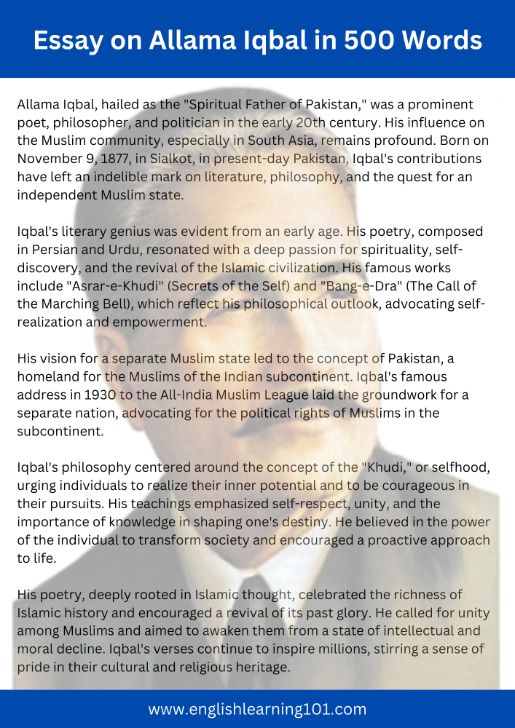Essay on Allama Iqbal in English

Allama Iqbal, hailed as the “Spiritual Father of Pakistan,” was a prominent poet, philosopher, and politician in the early 20th century. His influence on the Muslim community, especially in South Asia, remains profound. Born on November 9, 1877, in Sialkot, in present-day Pakistan, Iqbal’s contributions have left an indelible mark on literature, philosophy, and the quest for an independent Muslim state.
Iqbal’s literary genius was evident from an early age. His poetry, composed in Persian and Urdu, resonated with a deep passion for spirituality, self-discovery, and the revival of the Islamic civilization. His famous works include “Asrar-e-Khudi” (Secrets of the Self) and “Bang-e-Dra” (The Call of the Marching Bell), which reflect his philosophical outlook, advocating self-realization and empowerment.
His vision for a separate Muslim state led to the concept of Pakistan, a homeland for the Muslims of the Indian subcontinent. Iqbal’s famous address in 1930 to the All-India Muslim League laid the groundwork for a separate nation, advocating for the political rights of Muslims in the subcontinent.
Iqbal’s philosophy centered around the concept of the “Khudi,” or selfhood, urging individuals to realize their inner potential and to be courageous in their pursuits. His teachings emphasized self-respect, unity, and the importance of knowledge in shaping one’s destiny. He believed in the power of the individual to transform society and encouraged a proactive approach to life.
His poetry, deeply rooted in Islamic thought, celebrated the richness of Islamic history and encouraged a revival of its past glory. He called for unity among Muslims and aimed to awaken them from a state of intellectual and moral decline. Iqbal’s verses continue to inspire millions, stirring a sense of pride in their cultural and religious heritage.
Aside from his literary prowess, Iqbal was also a distinguished academic, obtaining degrees in philosophy and law from the University of Cambridge and the University of Munich. He later became a professor of philosophy, leaving an intellectual legacy that influenced many students.
Allama Iqbal’s impact extended beyond poetry and academia; he was actively involved in the political sphere, advocating for the rights of Muslims in British India. His efforts contributed significantly to the eventual creation of Pakistan in 1947, fulfilling the aspirations of millions of Muslims for a separate nation.
Iqbal’s legacy endures, not only in the creation of Pakistan but also in the hearts of those who continue to draw inspiration from his philosophy and poetry. His messages of self-respect, unity, and the pursuit of knowledge remain relevant and influential, transcending geographical and cultural boundaries.
In conclusion, Allama Iqbal was a multifaceted luminary whose philosophical insights and poetic expressions continue to reverberate across generations. His ideas of self-discovery, empowerment, and the reawakening of the Muslim community remain as relevant today as they were during his lifetime. His contributions have not only shaped the history of the Indian subcontinent but also serve as a guiding light for individuals seeking inspiration and guidance in their lives.
